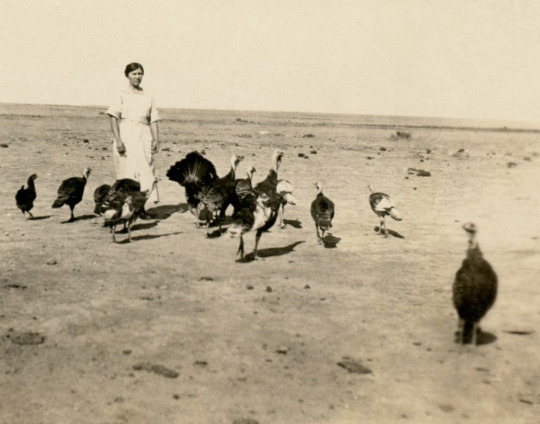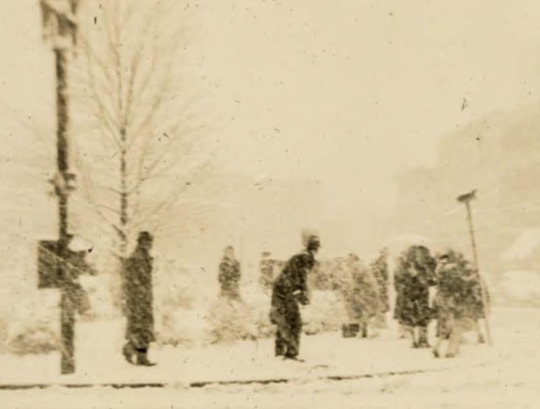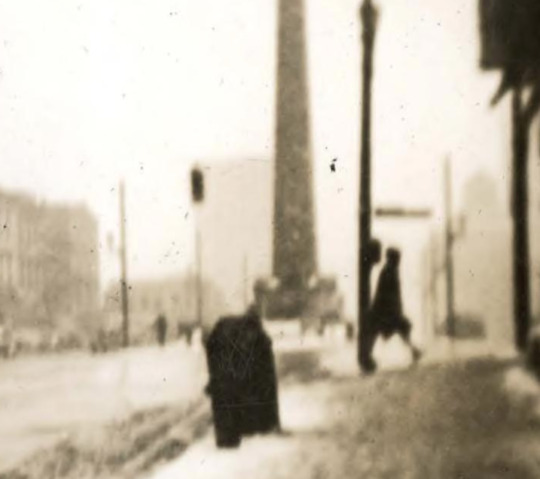Text

It seemed to Clara that every additional year spent at the University but served to emphasize its inadequacy. It was so also with the books she read and the thoughts and actions of the older people about her. Her aunt and uncle did not talk much, but seemed to take it for granted she wanted to live such another life as they were living. She thought with horror of the probability of marrying a maker of plows or of some other dull necessity of life and then spending her days in the making of stockings for babies that did not come, or in some other equally futile manifestation of her dissatisfaction. She realized with a shudder that men like her uncle, who spent their lives in adding up rows of figures or doing over and over some tremendously trivial thing, had no conception of any outlook for their women beyond living in a house, serving them physically, wearing perhaps good enough clothes to help them make a show of prosperity and success, and drifting finally into a stupid acceptance of dullness — an acceptance that both she and the passionate, twisted man beside her were fighting against.
Sherwood Anderson, Poor White, 1920
0 notes
Text

‘‘ Well, there’s going to be a new war here,” he said. ‘‘ It won’t be like the Civil War, just shooting off guns and killing peoples’ bodies. At first it’s going to be a war between individuals to see to what class a man must belong; then it is going to be a long, silent war between classes, between those who have and ' those who can’t get. It'll be the worst war of all.”
Sherwood Anderson, Poor White, 1920
0 notes
Text

“I hope the day will come soon when men and women will develop a new psychology along those lines. The first thing that should be settled after a couple become engaged is the money question. They should have a definite understanding as to how the money is to be spent after marriage, and the girl should see to it that she never drifts into a position where she must plead with some man for what rightfully belongs to her.”
“That sounds very pretty, my dear, but most girls are glad enough to catch a man without taking chances by arguing over money matters—they’re too scared of being old maids.”
“That’s mostly the fault of their training or, I should say, lack of training. So long as they are led 189to consider marriage the whole end and aim of life, I suppose they’ll go on getting into situations where they are compelled to cheat and steal and lie to secure a few paltry nickels. If I had a daughter, I should see that she was fully equipped to become a self-supporting, self-respecting member of society, a woman who would not look upon marriage as the only possible solution of life’s problems.”
Mrs. Adams rolled her eyes in horror. “Good gracious, woman, you talk like one of these here suffragettes. If I had a girl that talked like that I’d disown her. Why, you want to break up the home!”
“If financial independence for women means breaking up the home, then let it be broken. Poverty and the economic dependence of woman on man is the curse of the whole sex relation. It extends from the society matron who caresses and fawns upon a husband whom she loathes in order to wheedle him into the gift of a diamond necklace, a new mansion or other extravagance, through all the middle class women who lie and cheat and steal the household goods to get spending money, on down to the daughters of the poor who are forced to sell their bodies in order to exist. We frown upon European marriages, but expect our own girls to make good matches, marry for a home, do anything to catch a 190man. Faugh, the thought makes me ill. If we support the American idea of matrimony, then we must admit that the only proper basis for marriage is love. If we are to have free men, we must have free women who refuse to sell themselves for a home, social position, or material gain in any form whatsoever. We must adopt a single standard of morals, and abolish prostitution, both within and without the marriage relation.”
“Why—why, you—I’m surprised at you,” stuttered my companion. “I never heard a woman speak such words before. Such talk is indecent, that’s what it is, indecent.”
“The truth is often considered indecent, I believe, especially the naked truth. Like the human body, it needs to be concealed by a peek-a-boo waist of prudery and licentiousness.”
THE
ADVENTURES
OF A
WOMAN HOBO
BY
ETHEL LYNN, M.D. 1917
0 notes
Text

The old ways were so straightforward. There was humanity, and all around, but underneath, animals and plants. And things were going along well that way. You kill a hare, you harvest a fruit. A peach--it's nothing but sweet juice in your mouth; a hare-it's a heaped-up plateful of rich, dark meat. And afterward, you lick your lips, and you smoke a pipe on the front step.
It was simple, but it left a lot of things in the dark.
From now on it's going to be necessary to live in a lit-up world, and it's painful.
It's painful because it's not just humanity anymore, with everything else underneath, but there's a giant ill will and, way down below, humanity tossed in together with the animals and the plants.
He can feel the hill--alive and terrible--moving under his feet.
Jean Giono Hill, 1927, page 68
0 notes
Text
The life of a girl presented itself to her as something happy and heedless and unthinking, yet really guided and controlled by others, and going on amidst unsuspected screens and concealments. And in its way it was very well. Then suddenly with a rush came reality, came “growing up“; a hasty imperative appeal for seriousness, for supreme seriousness. The Ralphs and Mannings and Fortescues came down upon the raw inexperience, upon the blinking ignorance of the newcomer; and before her eyes were fairly open, before she knew what had happened, a new set of guides and controls, a new set of obligations and responsibilities and limitations, had replaced the old. “I want to be a Person,” said Ann Veronica to the downs and the open sky; “I will not have this happen to me, whatever else may happen in its place.” P75 Ann Veronica, H.G Well, 1909
0 notes
Text

…“And now, look at usl See what we have become. Toys! Delicate trifles! A sea of invalids. It is we who have become the parasites and toys. Ann Veronica, H.G Well, P40, 1909
0 notes
Text
"Watch out, now! The people aren't yet aware. They're all taken up by daily problems, still thinking of fighting and winning. But we know. Our political battle is already lost. This is only the beginning. There is nothing to be done….
You too…will discover yourself alone in a confused world as I have, and you won't be able to accept what's cooked and served up to you every day. You too, like Descartes when he was thinking out his Discourse on Method, will discover yourself some winter, with war raging outside and the country full of snow and cold, by a lighted stove in a nice warm room, wrapped in furs. And you'll start to debate all the ideas you've received and you'll reject them all until you've examined them, and you'll work your way back in that voluntary desert of reason to the origin of thought, pure reason alone."
Levi, The Watch, 1950, P177-178
1 note
·
View note
Text
“It was a dagger, eaten away by rust and with a handle shaped like a crucifix.
“How do you like that?” asked Rabinovich again. “A nice place they found for God—the handle of a deadly weapon. Are you going to deny it? God was the end and they turned him into the means—a handle. And the dagger was the means and became the end. They changed places. Ay-ay-ay! And where are God and the dagger now? Among the eternal snows, both of them!”
Bulgakov, Heart of a Dog, 1925, P127
3 notes
·
View notes
Text
As the car lurched over the snow he lifted his eyes and saw black people upon the snow-covered sidewalks. Those people had feelings of fear and shame like his. Many a time he had stood on street corners with them and talked of white people as long sleek cars zoomed past. To Bigger and his kind white people were not really people; they were a sort of great natural force, like a stormy sky looming overhead, or like a deep swirling river stretching suddenly at one’s feet in the dark. As long as he and his black folks did not go beyond certain limits, there was no need to fear that white force. But whether they feared it or not, each and every day of their lives they lived with it; even when words did not | sound its name, they acknowledged its reality. As long as | they lived here in this prescribed corner of the city, they paid mute tribute to it.
There were rare moments when a feeling and longing for solidarity with other black people would take hold of him.. He would dream of making a stand against that white force, but that dream would fade when he looked at the other black people near him. Even though black like them, he felt there was too much difference between him and them to allow for a common binding and a common life. Only when threatened with death could that happen; only in fear and shame, with their backs against a wall, could that happen. But never could they sink their differences in hope.
As he rode, looking at the black people on the sidewalks, he felt that one way to end fear and shame was to make all those black people act together, rule them, tell them what to do, and make them do it. Dimly, he felt that there should be one direction in which he and all other black people could go whole-heartedly; that there should, be a way in which gnawing hunger and restless aspiration could be fused; that there should be a manner of acting that caught the mind and body in certainty and faith. But he felt that such would never happen to him and his black people, and he hated them and wanted to wave his hand and blot them out. Yet, he still hoped, vaguely. Of late he had liked to hear tell of men who could rule others, for in actions such as these he felt that there was a way to escape from this tight morass of fear and shame that sapped at the base of his life. He liked to hear of how Japan was conquering China; of how Hitler was running the Jews to the ground; of how Mussolini was invading Spain. He was not concerned with whether these acts were right or wrong; they simply appealed to him as possible avenues of escape. He felt that some day there would be a black man who would whip the black people into a tight band and together they would act and end fear and shame. He never thought of this in precise mental images; he felt it; he would feel it for a while and then forget. But hope was always waiting somewhere deep down in him.
Wright, Native Son, 1940, Page 140
2 notes
·
View notes
Text
“Your feeling against that sort of thing is fine, James,” said Ray. “But that’s the most I
could say for it. It’s all right t to start out with nice theories from an advantageous point in your life. But when you get a to learn life for yourself, it’s quite another thing. the things you call fine human traits don’t belong to any special class of people. Nobody can pull that kind of talk now and get away with it, least of all a Negro.”
“Why not” asked Grant. “Can’t a Negro have fine feelings about life?”…
“No, modern education is planned to make you a sharp, snouty, rooting hog. A Negro getting it is an anachronism. We ought to get something new, we Negroes. But we get our education like—like our houses. When the whites move out, we move in and take possession of the old dead stuff. Dead stuff that this age has no use for.”
“How’s that?”
“Can you ask? You and I were born in the midst of the illness of this age and have lived through its agony. ... Keep your fine feelings, indeed, but don’t try to make a virtue of them. You'll lose them, then. They’ll become all hollow inside, false and dry as civilization itself. And civilization is rotten. We are all rotten who are touched by it.”
McKay, Home to Harlem, 1928, Page 242
0 notes
Text
“My mind walks along that narrow ridge, that dividing line between existence and non-existence is the one I keep trying to trace everywhere. The limit of resistance to—well, for instance, to what my father would call temptation. One holds out; the cord on which the devil pulls is stretched to breaking. a tiny bit more, the cord snaps—one is damned. Do you understand now? A tiny bit less—non-existence. God would not have created the world. Nothing would have been.”
Gide, The Counterfeiters, 1925, P 287
2 notes
·
View notes
Text
"…he's a gloomy and suspicious man, and, although deep down he may be very kind, he tends to see evil in just about everything--in that, however, he's very much like me. He greatly appreciates chivalry and generosity, but I believe that to him it's only a principle, an abstract ideal. I also know that he is capable of feeling remorse: he goes around constantly reproaching himself for something, regretting what he's done…But he never reforms--again, I'm probably just the same in that respect. He's stuffed with thousands of preconceptions and extraordinary notions, but there's not one original idea in his head. He looks for an opportunity to do something noble and heroic, but in the meantime he acts with petty nastiness…"
Dostoevsky, The Adolescent, 1875, P 294
9 notes
·
View notes




